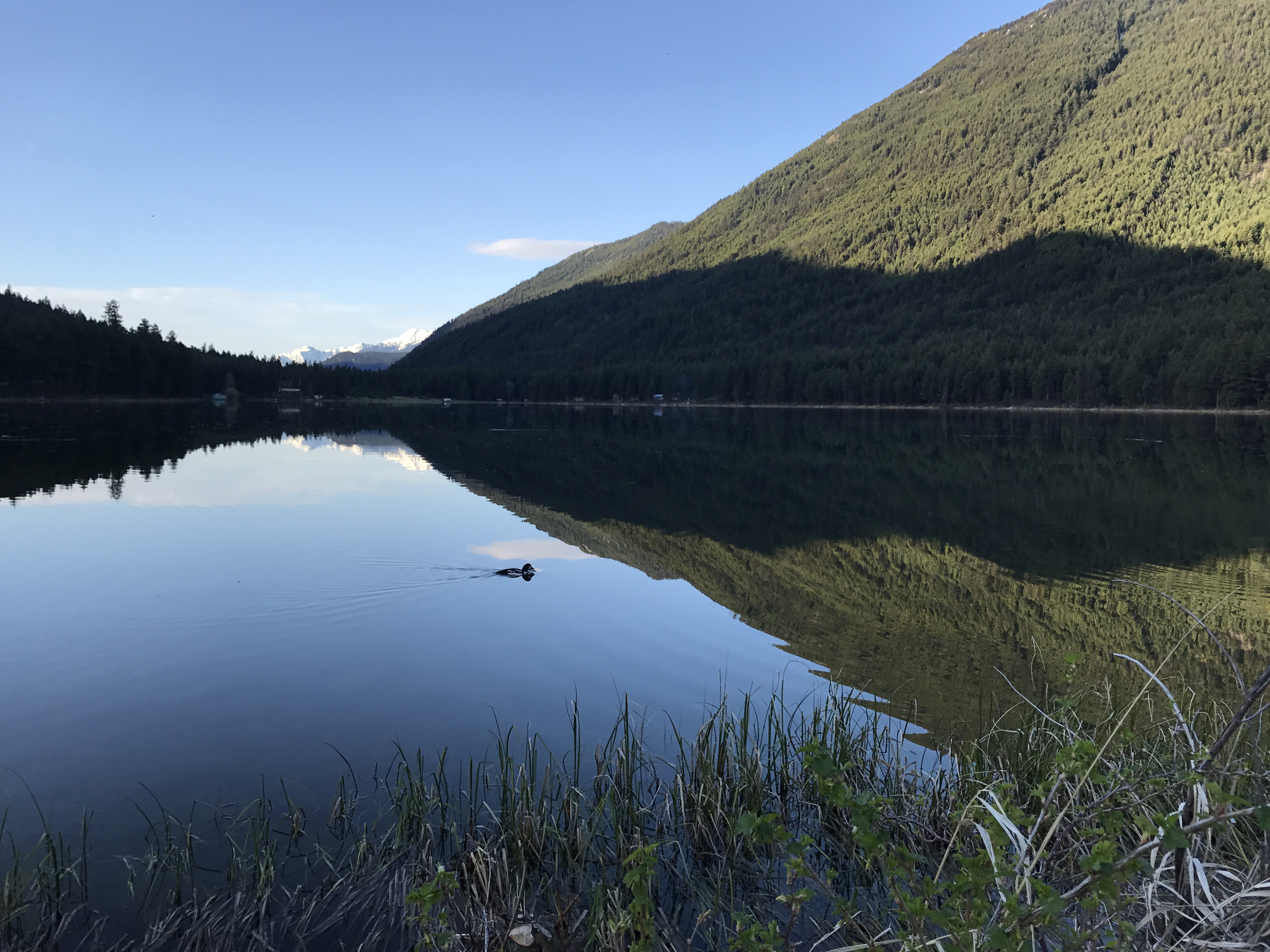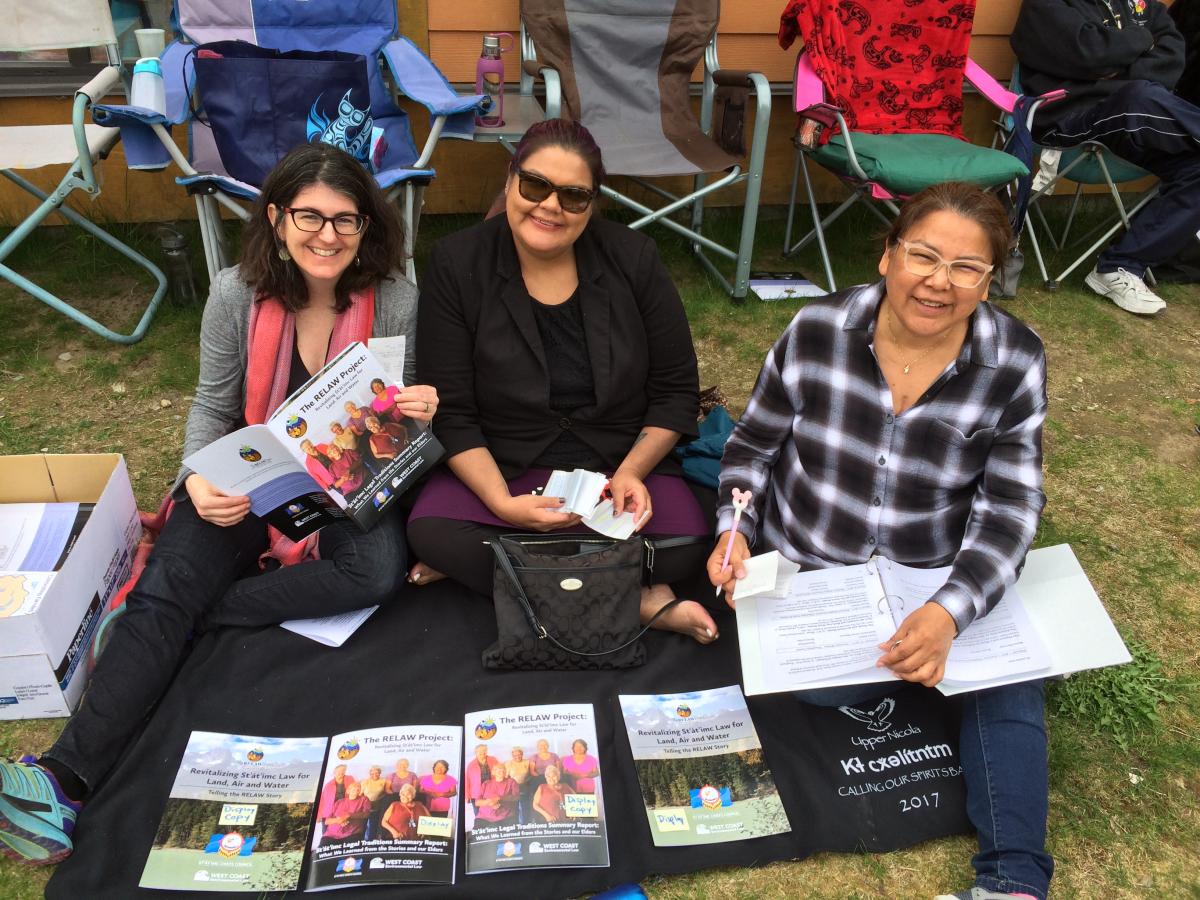
We are St’át’imc. We speak St’át’imcets (also referred to as Ucwalmícwts or the language of the people). Created by the Transformers, our home is situated at an intersection of deep gorges in the lee of the Northwest Coast Mountains, now referred to as British Columbia. We have been placed here by the Creator to live and be stewards of this land. Our inherent responsibility is to live in mutual accord with all, to care for, protect and honour all living beings here. To us, this is “Nxekmenlhkálha” (our ways/our laws).
So begins the new publication Revitalizing St’át’imc Law for Land, Air and Water: Telling the RELAW Story, which traces the work of the St’át’imc RELAW team over the course of a one year period from June 2016 to May 2017. During this time we read approximately a hundred publicly available St’át’imc stories, travelled throughout the territory to learn from the wisdom of Elders about the legal principles embedded in these stories, and met with members of all eleven St’át’imc communities.
The RELAW project – which stands for Revitalizing Indigenous Law for Land, Air and Water – was launched in 2016 to provide co-learning opportunities and legal support to Indigenous nations seeking to revitalize and apply their own laws to current environmental challenges.
The RELAW team received direction from the St’át’imc Chiefs Council to focus on water. As the St’át’imc Telling the RELAW Story publication states: “Water is necessary to maintain life as we know it and a great many St’át’imc stories relate and describe how powerful water is and how necessary it is for gaining and utilizing spiritual power. Water connects us as a people, and to all other beings in the territory.”
The St’át’imc RELAW team, consisting of Dean Billy and Helen Copeland from the St’át’imc Chiefs Council, and Lindsay Borrows and Jessica Clogg from West Coast Environmental Law, worked together to develop a written summary of St’át’imc legal principles related to land and resources, and to guide dialogue among St’át’imc citizens about applying these legal principles to water stewardship in the territory.
The St’át’imc RELAW project was a journey of mutual learning, healing and dialogue. Working with the stories provided a way for St’át’imc citizens of all ages, from all parts of the territory, to come together to talk about how to work together to better care for the water. In doing so we explored individual, family, community and nation level responsibilities in relation to water.
Overall, close to 300 St’át’imc citizens, including 90 Elders participated in the RELAW process. The outcomes from the RELAW research and a draft Water Accord were presented at the St’át’imc Gathering on May 10, 2017 and the main written reports from the project were shared at the St’át’imc Gathering on May 10, 2018.

(Photo Credit: Lindsay Borrows)
The following written reports were produced for educational purposes and to deepen understanding of St’át’imc law amongst all peoples. They are a contribution to the ongoing process of learning and revitalizing St’át’imc legal traditions and do not purport to be comprehensive or conclusive. There are limitations on their use, which are described in the documents:
Revitalizing Indigenous Law for Land, Air and Water: St’át’imc Legal Traditions Report : This 203-page report shares teachings from the stories and St’át’imc Elders about legal rights, responsibilities and standards, legal processes and decision-making, teaching, consequences and enforcement, as well as foundational legal principles and legal principles related to inter-community and international relations.
St’át’imc Legal Traditions Summary Report: What We Learned from the Stories and our Elders: This 44-page booklet uses images from the territory and quotes from knowledge holders to illustrate a summary of St’át’imc legal principles related to land and resources, with a particular emphasis on water.
Revitalizing St’át’imc Law for Land, Air and Water: Telling the RELAW Story: This short booklet describes the St’át’imc RELAW journey, who was involved and what the outcomes were.
 At a time where climate change and the combined impact of many human activities pose increasing challenges for the health of the land, air, water and communities, St’át’imc legal principles and those of other Indigenous legal traditions hold important learnings for us all.
At a time where climate change and the combined impact of many human activities pose increasing challenges for the health of the land, air, water and communities, St’át’imc legal principles and those of other Indigenous legal traditions hold important learnings for us all.
RELAW is an initiative of West Coast Environmental Law, supported and advised by the Indigenous Law Research Unit at the University of Victoria. You can learn more about the stories of the first cohort of RELAW participants in the short film RELAW: Living Indigenous Laws.
The second cohort of participants just completed their final learning session at Kvai lodge in Heiltsuk territory earlier this month.
Indigenous nations who are interested in learning more about participating in RELAW should contact Maxine Hayman Matilpi, RELAW Project Lead.
Top Photo Credit: Jessica Clogg